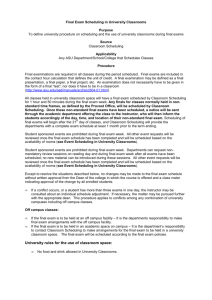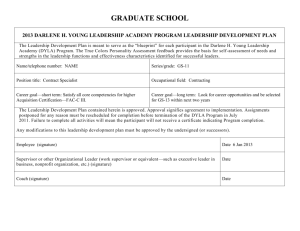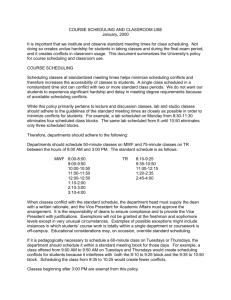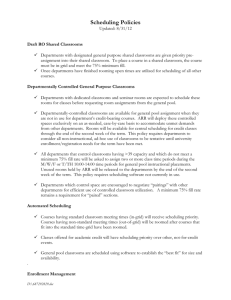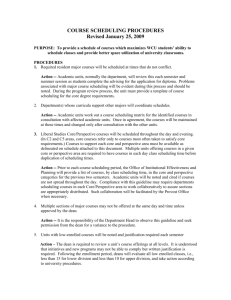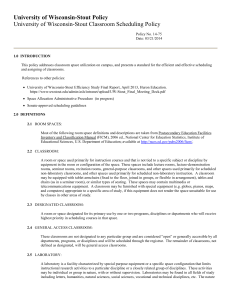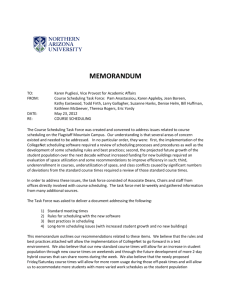DRAFT Policy on Course Scheduling for the
advertisement
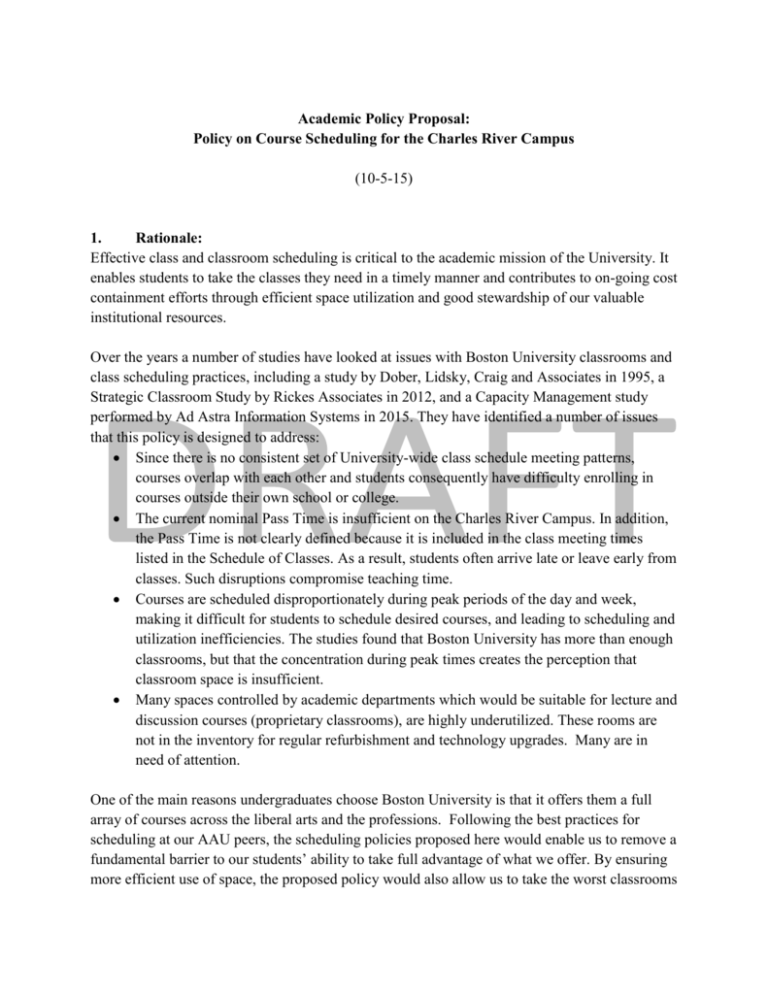
Academic Policy Proposal: Policy on Course Scheduling for the Charles River Campus (10-5-15) 1. Rationale: Effective class and classroom scheduling is critical to the academic mission of the University. It enables students to take the classes they need in a timely manner and contributes to on-going cost containment efforts through efficient space utilization and good stewardship of our valuable institutional resources. Over the years a number of studies have looked at issues with Boston University classrooms and class scheduling practices, including a study by Dober, Lidsky, Craig and Associates in 1995, a Strategic Classroom Study by Rickes Associates in 2012, and a Capacity Management study performed by Ad Astra Information Systems in 2015. They have identified a number of issues that this policy is designed to address: Since there is no consistent set of University-wide class schedule meeting patterns, courses overlap with each other and students consequently have difficulty enrolling in courses outside their own school or college. The current nominal Pass Time is insufficient on the Charles River Campus. In addition, the Pass Time is not clearly defined because it is included in the class meeting times listed in the Schedule of Classes. As a result, students often arrive late or leave early from classes. Such disruptions compromise teaching time. Courses are scheduled disproportionately during peak periods of the day and week, making it difficult for students to schedule desired courses, and leading to scheduling and utilization inefficiencies. The studies found that Boston University has more than enough classrooms, but that the concentration during peak times creates the perception that classroom space is insufficient. Many spaces controlled by academic departments which would be suitable for lecture and discussion courses (proprietary classrooms), are highly underutilized. These rooms are not in the inventory for regular refurbishment and technology upgrades. Many are in need of attention. One of the main reasons undergraduates choose Boston University is that it offers them a full array of courses across the liberal arts and the professions. Following the best practices for scheduling at our AAU peers, the scheduling policies proposed here would enable us to remove a fundamental barrier to our students’ ability to take full advantage of what we offer. By ensuring more efficient use of space, the proposed policy would also allow us to take the worst classrooms offline. Under guidelines to be developed, proprietary spaces would be included in the list of Registrar-scheduled rooms that receive regular renovation and technology upgrades. 2. Covered Parties: This policy covers all classes scheduled on the Charles River Campus. 3. Defined Terms: “General- Purpose Classroom” – The Postsecondary Education Facilities Inventory and Classification Manual of the National Center for Education Statistics description: Includes rooms or spaces generally used for scheduled instruction that require no special, restrictive equipment or configuration. These spaces may be called lecture rooms, lecture-demonstration rooms, seminar rooms, and general purpose classrooms. A classroom may be equipped with tablet armchairs (fixed to the floor, joined in groups, or flexible in arrangement), tables and chairs (as in a seminar room), or similar types of seating. These spaces may contain multimedia or telecommunications equipment. A classroom may be furnished with special equipment (e.g., globes, pianos, maps, computers, network connections) appropriate to a specific area of study, if this equipment does not render the space unsuitable for use by classes in other areas of study. “Pass Time” – the time between classes. “Prime Time” – includes all instructional minutes scheduled between 10:00 AM and 2:30 PM, Monday through Friday. “Proprietary classroom” – a classroom that is controlled by a school or college or an academic department, rather than by the Office of the University Registrar. 4. University Policy: This policy governs the scheduling of classes in the fall and spring semesters on the Charles River Campus. It applies to all undergraduate and graduate level course offerings. There will be a Pass Time of fifteen minutes between classes, and the actual class times (e.g., 8:00 AM – 8:50 AM, 9:05 AM – 9:55 AM, etc.) will appear in the Schedule of Classes. All in-person classes must utilize the standard meeting pattern, attached. Exceptions require the approval of the Dean and the Office of the Provost. Approved non-standard courses will be assigned to classrooms on a space-available basis. Non-standard meeting times are discouraged as they tend to overlap with one or more of the standard meeting patterns which may ultimately result in time conflicts for students. Schools and colleges must spread their courses across the day and the week. No more than 50% of a school/college’s courses may be scheduled on a Tuesday/Thursday schedule. No more than 60% of a school/college’s courses may be scheduled to meet between the hours of 10:00 AM and 2:30 PM. The Office of the University Registrar may use adherence to this provision as a factor in determining room allocation when the number of room requests for a particular day and time exceeds the number of available rooms. Proprietary rooms categorized as General-Purpose Classrooms will have a target daytime utilization rate of 50% for classes. These rooms will be assigned first to classes offered by the controlling academic unit and then to classes assigned by the Office of the University Registrar if the utilization target is not met. In responding to requests for course scheduling, the Office of the University Registrar recognizes the academic value of proximity to departmental and faculty offices and other relevant facilities. 5. Effective Date: Spring 2017 class schedule (September 1, 2016) This will coincide with the implementation of the University’s new course scheduling system. 6. History: In 2012 the Rickes Strategic Classroom Study made several recommendations for policy and process changes related to class scheduling, including the implementation of a “formal block schedule with clearly defined class start and end times, with a 15-minute pass time”, a requirement for “each department to schedule 50% of all courses each semester in off-peak time blocks”, and the allocation of “half of the scheduling window in proprietary general-purpose classrooms for use by the Registrar”. In 2013 a Faculty Advisory Board on Course Scheduling and Classroom Use was established. That group, with representatives from all the schools and colleges, reviewed the recommendations of the Rickes study and course scheduling policies among AAU institutions, and discussed a set of proposed scheduling policies for Boston University. In summer 2014, BU contracted with Ad Astra to model several possible standard schedules considered by the Advisory Board, using our current schedule as a model for the number, kind and duration of meetings BU would require. This proposal presents the policies discussed by the Faculty Advisory Board and the standard schedule developed in consultation with Ad Astra. 7. Additional Consultative Bodies: The standard consultative bodies for academic policies (Undergraduate Council, Graduate Council, Faculty Council, the Provost’s Cabinet, and the Council of Deans), and the Advising Network serve as the consultative bodies for this policy proposal. 8. Implementation: procedures, timeline and guidelines: The Office of the University Registrar will be responsible for leading the implementation in collaboration with the Charles River Campus school/colleges and academic departments. The OUR will partner with the departments, schools and colleges to assure that the new policy is understood, to monitor adherence, and to enforce compliance. 9. Related Policies: Policy on Credit Assignment to Academic Courses Attachments: A. Standard Meeting Patterns B. Schedule C. Rickes Study Recommendation 4 – Block Schedule D. Rickes Study Recommendation 5 – Scheduling Distribution E. Rickes Study Recommendation 6 – Proprietary Classrooms
